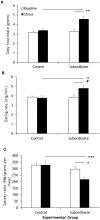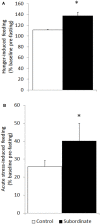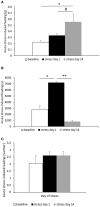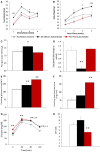Chronic subordination stress induces hyperphagia and disrupts eating behavior in mice modeling binge-eating-like disorder
- PMID: 25621284
- PMCID: PMC4300527
- DOI: 10.3389/fnut.2014.00030
Chronic subordination stress induces hyperphagia and disrupts eating behavior in mice modeling binge-eating-like disorder
Abstract
Background: Eating disorders are associated with physical morbidity and appear to have causal factors like stressful life events and negative affect. Binge eating disorder (BED) is characterized by eating in a discrete period of time a larger than normal amount of food, a sense of lack of control over eating, and marked distress. There are still unmet needs for the identification of mechanisms regulating excessive eating, which is in part due to the lack of appropriate animal models. We developed a naturalistic murine model of subordination stress induced hyperphagia associated with the development of obesity. Here we tested the hypotheses that the eating responses of subordinate mice recapitulate the BED and that limiting hyperphagia could prevent stress-associated metabolic changes.
Methods: Adult male mice were exposed to a model of chronic subordination stress associated with the automated acquisition of food intake and we performed a detailed meal pattern analysis. Additionally, using a pair-feeding protocol was test the hypothesis that the manifestation of obesity and the metabolic syndrome could be prevented by limiting hyperphagia.
Results: The architecture of feeding of subordinate mice was disrupted during the stress protocol due to disproportionate amount of food ingested at higher rate and with shorter satiety ratio than control mice. Subordinate mice hyperphagia was further exacerbated in response to either hunger or to the acute application of a social defeat. Notably, the obese phenotype but not the fasting hyperglycemia of subordinate mice was abrogated by preventing hyperphagia in a pair feeding paradigm.
Conclusion: Overall these results support the validity of our chronic subordination stress to model binge eating disorder allowing for the determination of the underlying molecular mechanisms and the generation of testable predictions for innovative therapies, based on the understanding of the regulation and the control of food intake.
Keywords: ghrelin; glucose; meal pattern analysis; obesity; pair feeding.
Figures




Similar articles
-
Stress, overeating, and obesity: Insights from human studies and preclinical models.Neurosci Biobehav Rev. 2017 May;76(Pt A):154-162. doi: 10.1016/j.neubiorev.2017.01.026. Epub 2017 Mar 11. Neurosci Biobehav Rev. 2017. PMID: 28292531 Free PMC article. Review.
-
Vulnerability to chronic subordination stress-induced depression-like disorders in adult 129SvEv male mice.Prog Neuropsychopharmacol Biol Psychiatry. 2011 Aug 1;35(6):1461-71. doi: 10.1016/j.pnpbp.2010.11.016. Epub 2010 Nov 17. Prog Neuropsychopharmacol Biol Psychiatry. 2011. PMID: 21093519
-
Stress-induced eating in women with binge-eating disorder and obesity.Biol Psychol. 2018 Jan;131:96-106. doi: 10.1016/j.biopsycho.2016.11.002. Epub 2016 Nov 9. Biol Psychol. 2018. PMID: 27836626
-
A new animal model of binge eating: key synergistic role of past caloric restriction and stress.Physiol Behav. 2002 Sep;77(1):45-54. doi: 10.1016/s0031-9384(02)00809-0. Physiol Behav. 2002. PMID: 12213501
-
The Role of the Endocannabinoid System in Binge Eating Disorder.Int J Mol Sci. 2023 May 31;24(11):9574. doi: 10.3390/ijms24119574. Int J Mol Sci. 2023. PMID: 37298525 Free PMC article. Review.
Cited by
-
The social defeat/overcrowding murine psychosocial stress model results in a pharmacologically reversible body weight gain but not depression - related behaviours.Neurobiol Stress. 2018 Sep 21;9:176-187. doi: 10.1016/j.ynstr.2018.09.008. eCollection 2018 Nov. Neurobiol Stress. 2018. PMID: 30450383 Free PMC article.
-
Endocrine disruptors alter social behaviors and indirectly influence social hierarchies via changes in body weight.Environ Health. 2015 Aug 5;14:64. doi: 10.1186/s12940-015-0051-6. Environ Health. 2015. PMID: 26242739 Free PMC article.
-
Ghrelin, Neuroinflammation, Oxidative Stress, and Mood Disorders: What Are the Connections?Curr Neuropharmacol. 2025;23(2):172-186. doi: 10.2174/1570159X22999240722095039. Curr Neuropharmacol. 2025. PMID: 39041263 Free PMC article. Review.
-
Food Addiction and Binge Eating: Lessons Learned from Animal Models.Nutrients. 2018 Jan 11;10(1):71. doi: 10.3390/nu10010071. Nutrients. 2018. PMID: 29324652 Free PMC article. Review.
-
A Framework for Developing Translationally Relevant Animal Models of Stress-Induced Changes in Eating Behavior.Biol Psychiatry. 2022 May 15;91(10):888-897. doi: 10.1016/j.biopsych.2021.06.020. Epub 2021 Jul 3. Biol Psychiatry. 2022. PMID: 34433512 Free PMC article. Review.
References
-
- American Psychiatric Association. Diagnostic and Statistical Manual of Mental Disorders. (Vol. 5). Arlington, VA: American Psychiatric Publishing; (2013).
Grants and funding
LinkOut - more resources
Full Text Sources
Other Literature Sources

